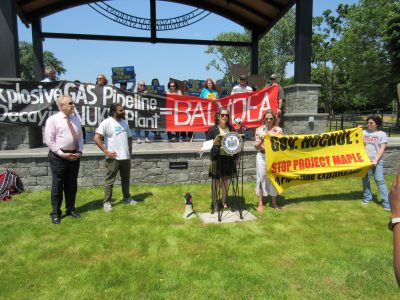Opposition Voiced Against Proposed Gas Pipeline Near Indian Pt.
News Based on facts, either observed and verified directly by the reporter, or reported and verified from knowledgeable sources.

Residents and officials rallied Monday at the Cortlandt Waterfront in Verplanck to voice their opposition to a planned expansion of a gas pipeline that runs next to the Indian Point power plants.
Known as Project Maple, the proposal is expected to be put on the table by Enbridge, a fossil fuel company who is seeking to expand its 1,100-mile-long Algonquin Gas Transmission Pipeline that sends fracked gas from New Jersey through New York and into Rhode Island, Connecticut and Massachusetts.
Appealing to Gov. Hochul to stop the plan from going forward was State Assemblywoman Dana Levenberg (D-Ossining) and Cortlandt Supervisor Dr. Richard Becker.
“It was here just a little over a year ago that we were fighting to keep industrial waste like radioactive nuclides out of the Hudson River,” said Levenberg. “We are going to continue to fight to keep polluters out of the Hudson, a fight we’ve been doing for many years to get the river clean.”
Standing at the shore of the Hudson River just about two miles south of Indian Point, Levenberg held up a letter signed by more than 70 local and state officials calling on Hochul to oppose Enbridge’s proposed gas pipeline expansion by denying any upcoming permit applications for the project. To date, Enbridge has not applied for any federal or state permits needed to begin Project Maple.
“Project Maple is a potential future project, and an application for Project Maple has not been filed with our regulator, the Federal Energy Regulatory Commission (FERC),” Max Bergeron, a spokesperson for Enbridge, stated in an email to Examiner Media. “We have ongoing discussions with possible project customers, such as natural gas utilities, to better define what this potential project could involve. As we advance a project, we organize public meetings, engage regularly with our neighbors, listen to comments from diverse groups and individuals, and seek opportunities to give back and have a positive presence in the community. Pipeline projects also go through extensive public permitting processes which provide additional opportunities for those interested to be heard. We are proud to serve our communities by responsibly delivering the energy we all rely on.”
This will be the third proposed expansion of the pipeline within the last 10 years, a pipeline that already transmits gas underneath the decommissioned Indian Point Nuclear Power Plant that houses more than 2,000 tons of irradiated fuel rods, in addition to other radioactive waste.
The previous two projects were both approved, against calls from local activists, by FERC and the CT Department of Energy and Environmental Protection (DEEP).
“We need to keep fossil fuels out of our energy make-up,” Levenberg told about 20 supporters standing behind her who held up banners and signs against the pipeline. “We need to keep out pollutants like methane which is a side effect of transporting gas through these pipelines, which means keeping Project Maple from even starting and putting our resources into clean, renewable and sustainable energy to feed the grid.”
Levenberg was joined by members of the Food & Water Watch group and the Indian Point Safe Energy Coalition. Other organizations actively against Project Maple include Stop the Algonquin Pipeline Expansion, United for Clean Energy and the Safe Energy Rights Group.
Becker pointed out that local river towns have always seen industrial pollutants burdening Hudson River communities including the dumping of radioactive tritium by the Indian Point power plant in the river about a year ago. He also reminded those at the rally of the upcoming Champlain Hudson Power Express transmission line which will run 339 miles in the Hudson River between the Canada-U.S. border to bring electricity to New York City.
“And at the same time we are the host of the Algonquin Pipeline and now they want to expand it with this project,” Becker said. “Fracking is bad and it damages the environment by injecting terrible chemicals into the ground at a time when we are trying to get off fossil fuels. On one hand, the state is telling us to get off gas stoves and use electric stoves and now they want to bring more gas in. Well, which way is it?”
New York State’s Climate Act has mandated greenhouse gas emissions to be reduced at least 85 percent by 2050. Currently New York State leads the nation in banning fossil fuels in new buildings, which will go into effect in 2026.
Santosh Nadabalan, Senior Organizer of Food & Water Watch, said there were many support groups working to keep the Hudson River clean.
“The Hudson River supports a wide eco system and a vibrant economy. We have stopped a ton of fossil fuel infrastructure projects in the last five years. We’ve been able to do this by mobilizing a grass roots movement to move our governor to do the right thing,” Nadabalan said.

Abby is a seasoned journalist who has been covering news and feature stories in the region for decades. Since The Examiner’s launch in 2007, she has reported extensively on a broad range of community issues. Read more from Abby’s editor-author bio here. Read Abbys’s archived work here: https://www.theexaminernews.com/author/ab-lub2019/
